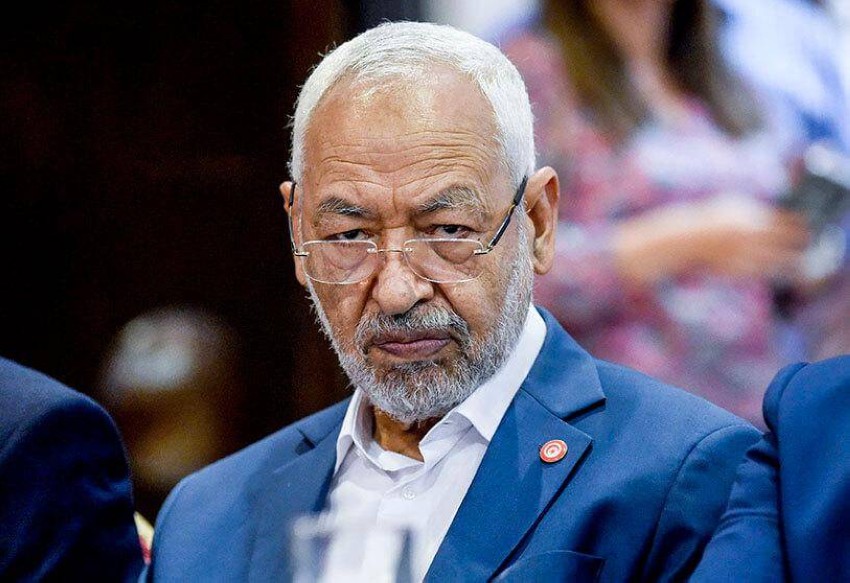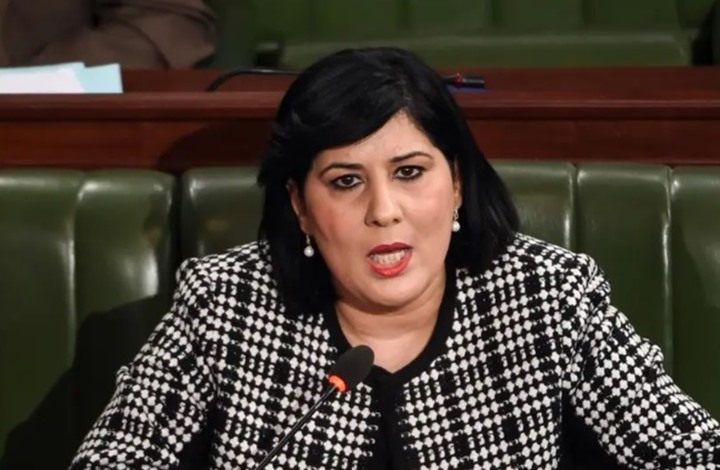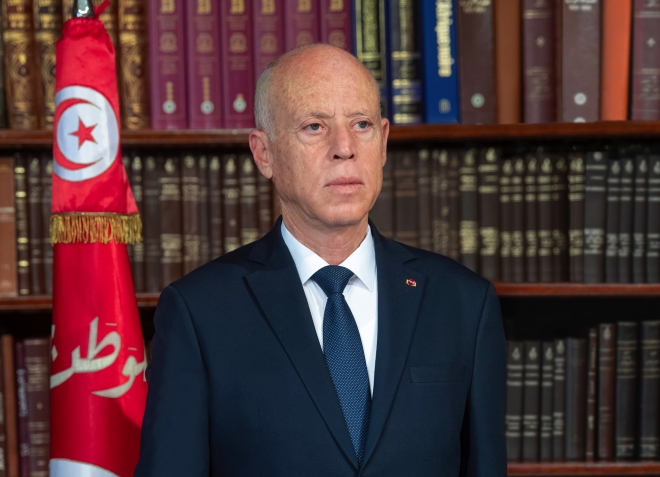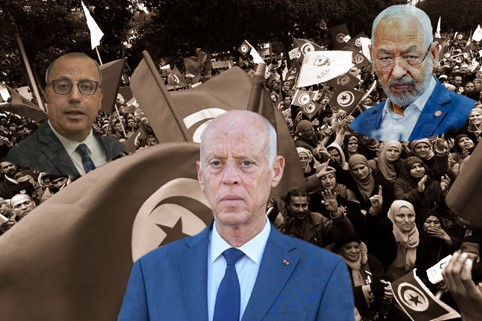Tunisia, like several countries of the region, suffers from ongoing protests and political turmoil. While one of the main concerns, the Libyan crisis seems to be on the way to a solution, there are other pressing problems.
The country never managed to regain stability after being the first Arab state in 2010 to see turmoil in the so-called Arab Spring. But it was still one of the rare positive examples of the phenomenon, as it did not collapse, and did not fall for any of the extremes. It did not become a radical Muslim Brotherhood state, nor did it became ruled by a military junta. Regardless of that, however, political instability was met with terrorist attacks and political infighting, which was only made worse by conflicting regional agendas, economic crisis, and finally the Corona pandemic.
In the 2019 presidential elections, the county found a truly national president in Qays Sa‘īd, but the subsequent parliamentary elections were less fortunate. The stalemate between the main parties resulted in fragile political agreements and weak governments collapsing one after the other. Since then the government of Hišām al-Mašīsī is the third one in the office, and his non-party cabinet is just as weak, as those before him. Recently he announced a major shuffle, but that might have already come late, not long after major protests broke out, which are still not sufficiently contained. And al-Mašīsī’s response had an uncanny resemblance to the last statements of late President Bin ‘Alī, just before he fell from power. Which made many speculate that the next “Arab Spring” might have just started.
Tunisia was the scene of major regional confrontations behind the scenes and there were indications that these conflicting agendas may tear the state apart from the inside. In spite of these escalating turmoils, which were only made worse by the Corona pandemic, the only stable force that desperately tried to keep the state together was the President.
Yet his reaction to the recent protests, which as well have their suspicion details, sparked serious international criticism, which personally targeted him, Qays Sa‘īd. In light of these major troubles came the news on 28 January 2021 that an assassination was prevented against the president. Which comes as the second such attempt in the last six months.
Is Tunisia really falling apart from the inside? The regional agendas started to manifest? Or the country now pays the price for resisting the pressure and evading a normalization process with Israel? How severe is the crisis in Tunisia and what does this mean to the region?
An overall crisis.
Tunisia is in a very deep crisis, much resembling that of Lebanon. While there is a very deep economic and social crisis, the main problem is that for many it seems that the policy class became completely out of touch with the realities of the people and sank into endless political rivalries. At the same time, Tunisia has been a battleground for a number of conflicting foreign policy agendas, and all manifested in the political spectrum.
The economy was on very weak grounds ten years ago, which was largely responsible for the fall of President Bin ‘Alī. Not much improved since, and complete regions of the country feel neglected. These are the main centers of the protests now. Tourism, which was a main source of income was heavily hit first by the so-called Arab Spring, and then years later by news of assassinations and terrorist attacks. Especially in popular tourist spots, like the ones in 2013 and in 2015. The situation only started to improve in recent years, when the Corona epidemic hit the county as well. This was extremely severe for several reasons. With complete seasons now falling out whole sections of the industry became unemployed. That happened before, though never in such a scale to which the usual answer was the much of the youth took jobs elsewhere, either moving within the country or trying their chances in Europe. Yet the result of the epidemic is that no such movement is possible, and even those how could get to Europe struggle to find employment. Because of the lockdowns movement even within Tunisia is difficult, and whole regions went unemployed, swelling the ranks of discontent.

Yet the political class seems to be very far from all this. Strangely enough, the main rivalry is not between the two biggest parties, the Islamist an-Nahḍa led by Speaker of the Parliament Rāšid al-Ġannūšī and Qalb Tūnis led by Nabīl al-Qaruwī – one of the biggest businessmen in Tunisia. Between them there seem to be good, though somewhat opportunistic cooperation, regardless of how fierce the election campaign was between them. The real enemy of the an-Nahḍa and personally al-Ġannūšī is a lady called ‘Abīr Mūsī, the leader of the Free Dustūrī Party. In many ways, she represents the old ways, as her party upholds ideologies once held by Būrqība and Bin ‘Alī, and fiercely opposes the Muslim Brotherhood-affiliated political groups. Yet in the last elections the partly only gained 17 seats coming in fifth, with very few real allies. While there is a fundamental ideological struggle between the two on the vision of social structure in the state, their conflict entered the realm of regional and big power conflict.

As long as the Libyan conflict was fierce, especially in mid-2020, when Turkey seemed to on the winning side, Rāšid al-Ġannūšī clearly enjoyed support from his biggest patron, the also Brotherhood-affiliated Turkish government. He regularly met with the Turkish President, and that caused the biggest resentment, as it was seen – and much advertised – that al-Ġannūšī behaves as if he was the head of the state. Yet in Tunisia, foreign policy is mainly dictated by the president. It was believed that the an-Nahḍa is clearly putting Tunisia on the map as Turkey’s firm ally, which was far from the truth and very very distant from the intentions of the president. During the summer clashes between al-Ġannūšī and Qays Sa‘īd were fierce, and the president could skillfully exploit that even within the an-Nahḍa there is great resentment towards al-Ġannūšī, as he should have stepped down by now from the chairmanship of the party.
While the prospect of transforming Tunisian into a Turkish bridgehead for the Libyan presence was worrisome, the other extreme is just dangerous to the state. The an-Nahḍa’s strongest opponent ‘Abīr Mūsī and her Free Dustūrī Party enjoy support from Saudi Arabia and the Emirates. Their conflict is in fact so severe that it was revealed that there are plans to overthrow the whole political system via violent street protests. And while there is opposition to the an-Nahḍa in the political class, many much rather cooperate with it for the sake of stability than with the violent methods of the Free Dustūrī Party.
At the height of this struggle, when the pandemic had already hit the country and protest were sporadically erupting – though many suspected foreign hands – came an even bigger struggle. Washington was strongly pushing the Arab states to follow the Emirati example and normalize relations with Israel. ‘Abīr Mūsī, a close ally of the Emirates was the main source of internal pressure for the normalization, though this policy was never openly expressed. On the other hand, the an-Nahḍa benefitted from its Qatari and Turkish allies’ position refusing the process. And finally, there was the president representing a strong national and pro-Arab policy also strongly refusing any talks on relations with Israel. And it should be pointed out that Tunisia was already shaken by a scandal in June 2019, when it was revealed the government at that time was pulling closer to Tel Aviv.
In the end, Qays Sa‘īd’s firm position kept Tunisia out of the normalization, which also caused strong resentment against him internationally. And this hit back now.
Tunisia is deeply divided. The people feel the parties are only concern about their squabbling. The main parties are in eternal rivalry, though none of them have a clear majority, and many are divided within as well. Thus there had been three main political focal points. Those in favor of the an-Nahḍa, or at least willing to cooperate with them, their strongest rival led by the Free Dustūrī Party, and the president, who pulled together the last two governments.
Suspicious protests.
On 14 January 2021 protest broke out in six major Tunisian cities against the pandemic lockdowns and the intolerable living conditions. That on its own would not be surprising, since Tunisia constantly saw protests since 2010 on varying levels, and in the present conditions, the resentment is understandable. What is suspicious is that he came only days after Prime Minster al-Mašīšī greatly reshuffled the government, clearly sensing the frustration. Also, compared to some previous ones and the gravity of the situation these current protests are not particularly big in numbers.
What is surprising, however, that while the first few days went largely unnoticed in the Arab, even in the regional press, the European sources were already talking about a possible “second Arab Spring”. And as if this was anticipated, as similar Western speculations were present in 2020 and in 2019 as well.
Given that, as we saw, that there are plans to destabilize Tunisia are reported, such speculation is very worrisome in Tunisia. The initially dismissive and then misjudged reactions by Prime Minister al-Mašīšī – and by many parties as well – only made the situation worse.
And that is when Qays Sa‘īd, the only political still having serious control over the streets intervened. He made several visits to the areas of the protests. He did manage to bring some calm, some remarks caused huge international criticism, and made him targeted above all else.
Assassination or fabrication?
Within these already precarious conditions came the news once again that the president was targeted in an assassination attempt. And once again, the news did not come from the president, but from a number of sources claiming to be close to him. The first reports had it that on 26 January a suspicious parcel was addressed to Qays Sa‘īd in the presidential palace, which contained a possibly poisonous strange substance. Though it was soon clarified that the president is well, it certainly derailed attention from the internal struggles and the protests. Especially since the president still had considerable popular support and possibly the closest political figure to the people.
By 29 January the investigations declared that there was no position in the package and the life of Qays Sa‘īd was not in danger. However, nor the president himself, nor his office, nor the authorities refrained from further commenting on the event.
The matter strangely resembles a similar incident, which happened in late August. At that time it was widely reported that someone tried to poison the bread delivered to the presidential palace to assassinate Qays Sa‘īd, which later turned out to be more of a myth. A day later the president himself went to the local bakery mentioned in the store and bought bread for his family, thus refuting the suggestions that he is unwell, or that he is afraid. The alleged assassination attempt turned out to be a fabricated story, which was defused by the president himself, but that does not answer the question of who was behind the matter. And what was to intention?
It might have been by people close to him trying to rally support for a president, who desperately try to find a balance between the different agendas. Yet these can also have been warnings that he can be reached and he should change his policies.
Whatever the case was, it is easy to see that the two incidents are connected. Only the intention is not clear. And it is not an easy matter, as Qays Sa‘īd is openly showing signs that he is worried for the security of the state. In July he made his first surprise night inspections to certain military and police compounds, clearly showing that he is in charge. Yet the picture was largely surprising since such a step was unfamiliar from most of his predecessors, and especially that he is not a military person at all.
Qays Sa‘īd has huge charisma and his election was a clear message back in the day that people are unhappy with the whole political establishment. Part of his charm is that he still regularly visits different parts of the country and still has a connection with the people. On 18 January, right after the current protests broke out he dared to visit the areas in question and he received support. Most of the protesters showed sympathy for him and demanded that he should dissolve the parliament. It is this still remarkable support and his firm stance on the country’s foreign policy principles that the president received a lot of foreign pressure.
During the visit, however, while talking to the people, some of his words were (mis)interpreted in a way as he was if he was blaming the Jews for the protests. Thought that was refuted the organization named Conference of European Rabbis started a huge campaign, accusing Qays Sa‘īd of antisemitism. Clearly, by now he himself is in the crosshairs.
Al-Mašīsī falling.
Whatever the real reasons and motivations for the protest, the reaction of the Prime Minister were unfortunate. Reacting only days later, he failed to meet with the people, but his statement greatly resembled the last speeches of Bin ‘Alī. Which on the ten years anniversary of the Jasmine Revolution is a very bad sign.
Al-Mašīsī only came to power in September 2020, after the previous government fell apart. Since then he was more of a caretaker than a real Prime Minister. He is a non-partisan, who served as an advisor to the president and from February 2020 as Minister or Interior in Ilyās al-Fahfāh’s government. When he was appointed by Qays Sa‘īd, as he was considered to be a man of the president enjoying mild support from al-Ġannūšī. Yet had several clashes with the president. His first real independent step was a reformation of the government. Days later the protests broke out. The new ministers only took office on 30 January, but at this stage, he seems to be losing control.
The protesters now openly urge the president to dissolve the parliament and issue new elections. If that happens the crisis will only grow. And there is little chance that the new elections would result in a considerably better political landscape. But as al-Mašīšī is losing control, there might not by any alternative to this.
And if Tunisia falls…
It is important to point out that Tunisia is in practical turmoil since the last general elections, which were expected to lead the country out of a deadlock of ineffective governments. The result was quite the contrary. As we analyzed it that time, their final result meant that no major party, even with its allies could form a majority in the parliament. Therefore all subsequent governments were the results of fragile political agreements, in which the an-Nahḍa gave its blessings to technocrat governments. As a result of this still, considerable blocking power the leftist parties, and mostly those being supported by the Emirates tried to remove an-Nahḍa leader Rāšid al-Ġannūšī from his office being the Speaker of the Parliament. The backlash brought on the fall of the government of al-Fahfāh. Since then the attempts and the counter-attempts to change the balance followed each other.
The President carefully balancing between the major sides tried to avoid getting sucked into daily clashes, and focused on major national agendas. However, his frequent visits to military and security compounds raised suspicions that he truly fears a coup attempt and the collapse of the state. While Qays Sa‘īd is still largely popular and in many ways the president the people wanted, he is the least the parties wanted. Because he is strong-willed, but not entirely leaning to either side. Which now starts to gain more irritation than following.
Therefore it is very possible that some sources, outer or internal, verily tried to eliminate him. While it is also possible that this was a somewhat amateur plot to rally support behind the president and derail attention from the ongoing protests, it is clear that the central authority is in trouble. And that is a regional matter.
Tunisia above all has significance, as the state, which ignited the so-called Arab Spring. Many suggested this might happen again, as the realities in the region changed little for the better in the last decade, but living conditions became almost unbearable in many states after the Corona pandemic.
If Tunisia was seen chaos once again that could ignite the same fire once again, as it did ten years ago. And there is a very fertile ground for that in many countries from Lebanon to Iraq. It would have a very bad impact on the Libyan crisis, but also many regional states, most importantly Algeria is worried that unrest might spread to them.
The fate of Tunisia is not of secondary importance, since it seems that after Libya Tunisia is becoming a battleground for several regional agendas. And while President Qays Sa‘īd does his best to keeps his country out of this, there might not be enough time left.



